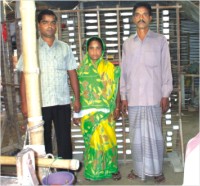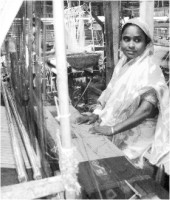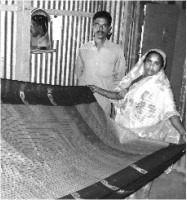| From Tangail
Weaving a Story of Success
Md. Nazmus Sakib

At first glance, Kashmira Khatun seems to be an ordinary woman. She is a wife and mother devoted to her family and household. However, the story of her life is far from ordinary. Her story is one of struggle, hope, betrayal and success. Besides being a wife and mother, Kashmira Khatun is also an entrepreneur. Starting off with small loans she has created an enterprise that produces and sells cotton jamdani saris. Besides allowing her family to live with financial comfort, her efforts have created employment for dozens of people in her village.
Kashmira recalls times in the past when things were not so rosy. Born into a poor family her education was limited she could only write her own name. She was married off when she was thirteen. She made a lot of sacrifices for her family. Her husband managed to go abroad to try to earn more, but his endeavours ended tragically due to betrayal from a trusted relative. After unsuccessfully trying to commit suicide, Kashmira, with the aid of her father, brothers and the Society for Social Service (SSS) slowly began to turn things around. The woman who once struggled to get three square meals a day was now the owner of assets worth over taka 10 lakh.
 Star Insight had the opportunity to speak to Kashmira and learn about her life, her struggles, her business, and her hopes for the future. Star Insight had the opportunity to speak to Kashmira and learn about her life, her struggles, her business, and her hopes for the future.
Why do you consider yourself to be a successful small entrepreneur?
I used to be very poor. I was a day labourer, weaving saris. In 1998 I enrolled into the SSS micro-credit scheme. Because I was so poor at the time, I initially received Tk 2000 from the organisation. On top of that, I borrowed some money from my father. With this money I purchased two old weaving machines and installed them in my home. My husband and I worked tirelessly. My skill in making better saris, my business management acumen and my financial strength continued to increase day by day. Thus, my profits allowed me to increase my personal wealth and also grow my business. Due to my successful business the organisation change my loan status from small entrepreneur to entrepreneur. In phases, SSS increased the amount of my loan according to my needs. I once lived in poverty but now I am the owner of 16 weaving machines. I have created employment for 34 workers in my weaving factory. I can pay Tk 80,000 to my workers every month. Because of taking training in micro-credit and management from the organisation, my skill in broadening my marketing network has increased. In the last ten years I have become the owner of assets worth Tk 10,17,000.
How do you take care of your family and your business at the same time? How does your situation compare with other women who do not have businesses?
Before, it was really difficult to the household since we earned so little. The growth of the business has meant that the family's earnings have increased. Earlier, I had put a lot of effort into my business. I could not give enough time to my family. Hiring workers has reduced the amount of personal effort I have to put in. This is why I can now spend more time with my family and thinking about my business management. Success has allowed me to devote more care to my family. Now my family is disciplined. Financial stability has left my business and my family in a better place than before.
Our tireless efforts have shown others the path to success. Other women in the area have also taken small loans but have failed to change their fortunes since they were unable to utilise their loans properly. Even as a woman, I am able to run my business properly. I have the support of my husband and son. My status in the field has gone up, as well as the weight of my opinions. People praise my efforts. They point to my success as an example. Compared to other poor families involved in micro-credit schemes, we are now quite independent.
 What challenges do you have to face? How do you tackle them? What challenges do you have to face? How do you tackle them?
There are so many challenges. Here are some big ones: I cannot market my goods on my own, I need the help of my husband and son. As the number of weaving machines has increased, it is no longer possible to keep accounts on my own. Natural disasters, especially floods and continuous rain always leave the possibility of harming the produced saris. Then of course there are the financial constraints when trying to ensure that my saris are of better quality than those produced by other weavers in the area. I have tackled these problems by taking loans from the SSS. I keep trying my best.
How have others been benefited or been inspired through your efforts? What kind of support is your enterprise getting from your family members?
A lot of people in my area have taken up weaving saris after seeing what I've done. Among them, my neighbours Jewel, Kamruzzaman, Nurul Islam are noteworthy. They are earning profits by marketing their goods. Weaving is spreading across the area. My family has five members. My husband and I are constantly involved with different aspects of the weaving process. I monitor the activities of the workers involved in the production of the saris. My husband and son market the saris. They gather the required raw materials and take care of the accounts. My youngest daughter studies in class 8. Even she sometimes helps by dyeing and processing the thread.
What are your future plans?
I am very hopeful about my enterprise. I have far-reaching plans for the future. I intend to take larger loans from the SSS and set up a large jacket weaving factory. This will provide employment for a lot of people.
 The entrepreneur speaks: The entrepreneur speaks:
I am Kashmira Khatun. I have worked very hard over the last decade. I have managed to increase my knowledge, skills and qualifications. I finally found success producing woven textiles. Over time I started to see success. Once I was poor. In 1998, I began producing woven textiles on my own initiative.
I come from Tangail, the upazila Kalihati. My home is in the Tenguria village of Bolla union. My father Eshak Uddin was involved in weaving and farming. The earnings from his weaving were not enough to support a family of 11 which included five sisters and four brothers. Struggle was always there in the household. The year was 1980. I was 13. Due to financial struggles I was married off to Md. Montu Miah from a poor family in my village. Back then my husband was a worker in a weaving factory. It was not possible to run the household with my husband's earnings.
To send my husband abroad my mother and I sold five bhori of gold for Tk 25,000. We borrowed Tk 20,000 from my brother and Tk 25,000 from my husband's brother. With Tk 70,000 my husband went off to work in Saudi Arabia on 3/1/1998. My husband used to send money to his elder brother's account, in good faith. I used to get only Tk 500 a month as an allowance. Within 3 years my husband paid off all his debts. He sent nearly Tk. 6,00,000 to his brother's account after working there for five and a half years. In this time my father-in-law and mother-in-law passed away. I became the mother to one son and two daughters.
I should point out here that my bhashur opened a factory at the local Bolla Bazaar using the Tk 1,20,000 that my husband had sent. My husband fell ill abroad and came back home. After regaining his health, my husband asked his brother for the money he had sent from abroad. My husband's brother let him know that all the money had been spent and he had no money left. While we sought justice, we never got it. When my husband became certain that his elder brother had usurped his hard-earned money, the grief and sadness of that loss made him go insane. I had to control my insane husband, pay his medical expenses and look after the household. The meagre financial assistance that I received from my brothers made running all my affairs a difficult job. Financial hardship had hit us so hard that if we had one meal, we had to forgo the next. Poverty on the one hand and the torture of an insane husband on the other forced me to choose suicide by drowning in the river. But luckily I survived.
With the help of my brothers and borrowed money I got treatment for my husband at Dhaka Medical Hospital. After six months of treatment my husband became fully healthy. Due to the financial hardship in my family I sent my son Kamrul Hasan to my father's house. I did not have enough money to open a path for earning with my husband and son. At this point in time I got to know a Field Organiser from SSS. He told me of the benefits of the SSS small loans. On his advice I enrolled in the No. 55 Tenguria Madhyapara Women's Society on the 19th of February 1998. I saved up regularly. I initially received a Tk. 2,000 loan from SSS. I bought two broken weaving machines with that and spent Tk 2,000 on repairing them. Then I started producing saris. Since I did not have a weaving house of my own, I installed the machines in my father's house. This is how my struggle to change my days started. Since my brothers were involved in the weaving trade they initially helped me greatly. From this I made a weekly profit of Tk 1,200. I reinvested a portion of this profit as capital for business. I would make Tk 5,000 every month. Initially production was run by the efforts of my family.
At different times I took part in six training courses organised by the SSS. Among them, small enterprise development and management related courses are noteworthy. By taking part in this training I was able to get a clear idea on business knowledge, skill and market management. This training had a major contribution towards making me a successful entrepreneur. Not just myself, but the knowledge gained from the training benefited my husband as well.
After paying back my first loan, I took Tk 4,000 in the second phase and Tk 6,000 in the third and added four weaving machines. Thus I had a total of 6 weaving machines. Seeing the success of my business and my good dealings the organisation gave me Tk 10,000 in the fourth instalment. With this money and some inherited land, I built a small house. I moved my weaving machines from my father's house to my own home. I took Tk 15,000 in the 5th phase. As a small entrepreneur I took Tk 25,000 in the sixth phase, Tk 50,000 in the seventh, Tk 80,000 in the eight, Tk 1,00,000 in the ninth and finally I took Tk 1,20,000 in the tenth instalment and invested it in my weaving business.
The profits from the sari project helped to slowly relieve the financial hardship of my household. Currently I have 16 weaving machines. 34 workers, 24 male and 10 female, have found employment here. Among them 16 are craftsmen, 3 are drum masters, 2 are colour masters, 4 work with the thread, 1 is a designer. Furthermore there are 10 other women for specialised duties. Other tasks are done by four members of my family. Work is done in two shifts night and day. The wages of the workers are determined by the quality of their work and the quantity of their production. Tk 80,000 is spent every month to pay the workers.
Earlier I used to buy the main raw materials for making saris, thread and dye from the 'mahajans'. For this reason they used to make more money from me. Now the scope of my business and the demand for saris has increased. Now, every month I purchase thread worth nearly Tk. 80,000 and dye worth around Tk. 5,000 from Bolla and Tangail. With the help of my employees I produce 80 cotton jamdani saris a week from the 16 weaving machines. These saris are sold in Tangail, Korotia Hat and Pathrail. I also fulfil the orders of whole-sellers in Dhaka, Rajshahi, Khulna, Gopalganj and Faridpur. More saris are sold in the Eid and Puja seasons. Tk 1,60,000 is earned each month from the sale of the saris. The yearly earning from the sale of the saris is Tk 19,20,000. Employee wages, purchase of raw materials, transport and other additional expenses come up to Tk 15,36,000 annually. That leaves a profit of Tk 3,84,000. The amount left from the profit after repaying the loans is added to my own capital.
By using Tk 1,00,000 from the profits of sari production I have built a showroom to sell saris for my son in Bolla bazaar since he had a showroom there. Till now he has saved up Tk 50,000. Besides this my son has deposited Tk 20,000 as a member of the “rice society” and Tk 5,000 as a member of the weaver's society. All these savings deposits have come from the profits of the business. I have enabled my older daughter to get an education. She has passed the S.S.C. exam in the first division with two letters. After that I arranged a marriage for her. Overall, my family life is now quite smooth. At one time we had just one room. Now we have five tin houses. Among them one is a tin shed building. According to the needs of my weaving project I have also bought the required machinery. Along with the necessary furniture I have also made four bhoris of jewellery which are currently worth Tk 80,000. My assets are worth Tk. 10,17,000. All of it is the fruit of the earnings of the last ten years.
Others like my neighbours Jewel, Kamruzzaman, Nurul Islam and many others have taken up the weaving trade after being inspired by my efforts. My weaving business has provided full-time employment for 16 and part-time employment for 18 unemployed men and women. They are now able to stand on their own two feet. I have overcome poverty. My future plan involves establishing a large scale hook jacket weaving factory, where many unemployed men and women will find work.
Tell us about the distribution of your produced goods.
Every month, my husband buys thread, the main raw material for producing fabrics and lots of different dyes from the local Bolla Bazaar and Tangail. My husband and I, with the constant help of our employees can produce on average 80 saris a week from 15 weaving machines. I sell my produced saris every week at one of Tangail's Korotia Haat. Whole-sellers who buy from me come from Dhaka, Bogra, Chittagong, Khulna, Rajshahi and Sirajganj. I supply saris according to the quality and designs they specify. I generally sell my saris for cash. I take orders over the phone too.
What are the chances of your enterprise growing even larger? How do your efforts benefit remote areas?
It is unlikely that you will be able to find a woman who does not like saris. It becomes even more unlikely if the sari in question is a cotton jamdani sari from Tangail. This is because the woven saris of Tangail have gone past our country's borders and have won the hearts of women aboard. For this reason, day by day the demand for saris is increasing and export abroad is taking place. That is why there is a good chance for my business to survive in the future. Currently my saris are being distributed in Dhaka, Chittagong, Khulna, Rajshahi, Faridpur and Gopalganj districts.
In the last three years what has been the revenue and profits of your enterprise?
The revenue from the sale of the saris has totalled Tk. 57,60,000 and the profit has been Tk. 11,52,000.
Has your enterprise been affected by natural disasters? If so, how did you tackle it?
I lost nearly Tk 10,000 during the flood of 2007, since the weaving machines were shut down for a month I had to pay the poor weavers although they could not do any work. Initially I paid the workers from our savings. Later on I was able to replenish my savings from the profits of my business.
Is your business polluting the environment?
My business is certainly environmentally friendly. I do not use any chemicals which may harm the environment. The dyes that are used are all spent on the fabrics. Besides this, any chemicals that are used to dye the thread which are leftover or have become waste are disposed of in a hole in the ground near my house and is then covered with earth. My project has ensured the hygienic sanitation of 34 workers.
Copyright
(R) thedailystar.net 2008
|
|
